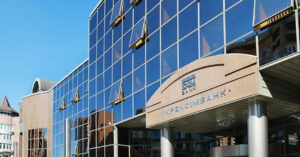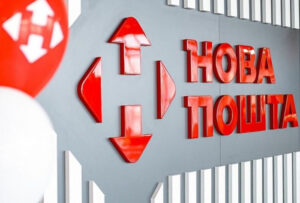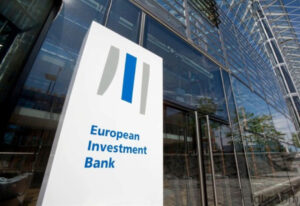
The European Bank for Reconstruction and Development (EBRD) will provide a risk-sharing guarantee without pre-financing to the state-owned Ukreximbank in order to expand financing and provide new loans to Ukrainian businesses in the amount of EUR100 million.
As stated on the EBRD website, whose board of directors approved the relevant project on September 9, it will cover up to 50% of the credit risk.
According to the published information, the guarantee will be provided in two equal tranches, with the second tranche currently without obligations.
It is noted that up to EUR 20 million of sub-loans with risk sharing will be directed to finance long-term investments by SMEs under the EU4Business-EBRD Credit Line with incentives, which will allow financing long-term capital investments by SMEs to upgrade their technologies and equipment to EU standards, including investments in sustainable and green technologies (at least 70% of the sub-limit).
Eligible sub-borrowers will also receive EU-funded technical assistance and grant support in the form of investment incentives upon completion of their investment projects.
Ukreximbank is the third largest bank in Ukraine in terms of total assets as of mid-year – UAH 318.6 billion (8.3% of the system’s total assets).

The European Bank for Reconstruction and Development (EBRD) is providing a risk-sharing guarantee without upfront financing to Raiffeisen Bank to expand financing and provide new loans to Ukrainian businesses in the amount of EUR200 million. The relevant agreement was signed in London on September 9.
“The EBRD instrument will cover up to 50% of Raiffeisen Bank’s credit risk under new financing agreements for businesses operating in Ukraine. Under this mechanism, the bank will provide sub-loans to companies operating in critical sectors of the economy, such as agriculture, industrial production, pharmaceuticals, transport, and logistics,” the Ukrainian bank said in a press release on Wednesday.
According to the press release, this is already the fourth such risk-sharing agreement concluded by the EBRD with Raiffeisen Bank.
It is noted that 20% of the sub-loans covered by the EBRD guarantee will be provided to MSMEs for long-term investments in EU-compliant technologies and green technologies, strengthening the competitiveness of such enterprises in domestic and foreign markets.
Sub-borrowers who meet the conditions will also be able to receive EU-funded technical support and investment incentives, such as grants to complete their investment projects, under the EU4Business initiative. Larger incentives will be provided to businesses and households most affected by the war (e.g., those whose assets have been destroyed, damaged, or relocated), as well as to sub-borrowers that promote the reintegration of war veterans, people with special needs, internally displaced persons, and/or enterprises located in areas most severely affected by the war.
The EBRD guarantee will be supported by partial coverage of first-loss risk received from France and the EU under the Ukraine Investment Framework.
Since the start of the full-scale Russian-Ukrainian war, the EBRD has enabled more than EUR 3 billion in financing to Ukrainian borrowers through 37 similar instruments in partnership with 12 financial institutions.
Raiffeisen Bank is the largest privately owned bank in Ukraine and the fourth largest overall, with total assets of UAH 252.23 billion (6.5% of the system’s total assets) as of mid-year.
Raiffeisen Bank was founded in 1992. According to the financial institution, 68.21% of its shares are owned by Raiffeisen Bank International AG (RBI), 30% by the EBRD, and the remaining 1.79% by minority shareholders.

Agroholding Agrotrade received UAH 120 million in financing from Raiffeisen Bank as part of the European Bank for Reconstruction and Development (EBRD) risk-sharing program, the agroholding’s press service reported on Facebook.
It is noted that these funds will be used to cover seasonal needs: payment for agricultural services, purchase of fertilizers and plant protection products, as well as preparation for a new production cycle.
In addition, the company will attract an EBRD grant under the Human Capital Investment Incentive Program. It will be used to improve working conditions for employees and will be financed by the Kingdom of the Netherlands through the EBRD’s Special Crisis Response Fund.
“This result is the culmination of a year and a half of work with the EBRD. The negotiations were not easy, as our assets are located in the northeastern regions of Ukraine, which are considered high-risk. But we have proven that we are able to work effectively in any conditions, maintaining transparency, discipline, and responsibility to our partners,” said Antin Zhdanov, Deputy CEO for Economics and Finance at Agrotrade Group, whose words are quoted in the press release.
“Our cooperation with the EBRD under the risk-sharing program makes credit financing more accessible for agricultural companies, even in frontline regions. This has a positive impact on the recovery of the economy and the agricultural sector in particular,” said Larisa Bondareva, Deputy Chair of the Board of Raiffeisen Bank.
Analyzing the advantages of the project, the agricultural holding explained that Agrotrade gained financial flexibility and was able to purchase resources for production cycles on time, Raiffeisen Bank received guarantees for part of its loan portfolio, and the EBRD implemented its strategy of supporting business in regions affected by the war.
The Agrotrade Group of Companies is a vertically integrated holding company covering the entire agro-industrial cycle (production, processing, storage, and trade in agricultural products). It cultivates over 70,000 hectares of land in the Chernihiv, Sumy, Poltava, and Kharkiv regions. Its main crops are sunflower, corn, winter wheat, soybeans, and rapeseed. It has its own network of elevators with a one-time storage capacity of 570,000 tons.
The group also produces hybrid seeds for corn, sunflower, barley, and winter wheat. In 2014, a seed plant with a capacity of 20,000 tons of seeds per year was built on the basis of the Kolos seed farm (Kharkiv region). In 2018, Agrotrade launched its own brand, Agroseeds.
The founder of Agrotrade is Vsevolod Kozhemyako.

The European Bank for Reconstruction and Development (EBRD) is providing the VARUS Group retail chain with a $25 million loan to expand its retail operations and improve business sustainability, according to the EBRD press service.
This food security project, with a total value of $53.1 million, will receive a 22% first loss risk coverage provided by the EU under the Investment Facility for Ukraine (UIF) through the Municipal, Infrastructure and Industrial Resilience (MIIR) program. To date, the EU has allocated EUR 207 million in guarantees and grants to Ukraine through the EBRD under the Ukraine Investment Facility (UIF), 87% of which has been provided to the private sector.
The guarantee for Varus plays a crucial role in mitigating the heightened macroeconomic and geopolitical risks associated with the investment. The support is provided in recognition of the project’s alignment with the bank’s Green Economy Transition (GET) approach through energy-efficient modernization, the installation of renewable energy sources, and the improvement of sustainable logistics. It includes the installation of solar panels, high-efficiency lighting, and reversible split air conditioning systems with low global warming potential.
VARUS Group is the fifth largest food retail chain in Ukraine. The chain consists of 114 stores, most of which are located in the eastern part of the country, employing around 7,500 people. Despite the closure of some retail outlets due to the war, the group has opened new stores and been able to return to its pre-war size. The EBRD loan will enable further expansion of the VARUS network, the refurbishment and modernization of equipment in existing stores, the lease of a new warehouse, and the installation of photovoltaic systems to reduce dependence on the electricity grid.
Cooperation with the EBRD will help preserve Ukraine’s human capital and the livelihoods of workers despite the ongoing challenges of wartime through technical cooperation. The project will also benefit from a co-investment grant to optimize warehouse logistics, improve energy efficiency, and address urgent human capital needs.
Technical support is funded by the EBRD’s Multilateral Donor Fund “Action for Equality and Gender Equality” (A4EG), while project preparation and the co-investment grant are funded by the Japan-EBRD Cooperation Fund.

The European Bank for Reconstruction and Development (EBRD) has granted a loan of up to EUR50 million to Nova Poshta LLC, part of the Nova Group, to finance part of its capital investment program for 2025-2026.
According to the bank’s press release on Friday, the loan will be multi-currency with the option of drawing funds in hryvnia and euros and will consist of two tranches: the first tranche of EUR35 million will be provided upon signing, and the second tranche of EUR15 million will be reserved by the bank at its sole discretion.
According to the release, Nova Poshta’s development strategy supported by the loan includes improving physical infrastructure, optimizing and expanding the network, modernizing IT systems, improving energy management and restoring human capital, as well as decarbonization and wider access for women.
The total cost of the project is EUR69.1 million, according to the announcement.
The EBRD financing is guaranteed by a first loss guarantee covering 15% of the EBRD loan amount provided by the European Union (EU) under the Ukraine Investment Framework for Municipal Infrastructure and Industrial Resilience (UIF MIIR).
An investment grant of up to EUR1.5 million is also expected to be provided to support decarbonization and human capital restoration programs supported by the TaiwanBusiness-EBRD Technical Cooperation Fund and the Crisis Response Special Fund (CRSF).
According to the release, in 2024, Nova Poshta set a new record by delivering 429 million shipments, 16% more than in 2023, and the significant growth in demand, in turn, created a need for further expansion.
Nova Poshta is the main operating subsidiary of the Nova Group, which is owned by two Ukrainian businessmen, Vyacheslav Klimov and Volodymyr Poperechnyuk. It operates a network of over 39,000 service points and has around 33,000 employees in Ukraine, serving over 11 million customers every month.
The EBRD has been successfully cooperating with Nova Poshta since 2018, financing four of its projects during this time.
According to Nova Poshta’s financial report for the first quarter of 2025, its consolidated net income increased by 20.7% compared to the first quarter of last year, to UAH 14.3332 billion, while net profit decreased by 21.4%, to UAH 567.7 million. The ultimate beneficial owners of the company are Volodymyr Poperechnyuk and Vyacheslav Klimov.

The European Bank for Reconstruction and Development (EBRD), the European Investment Bank (EIB) and the European Commission are launching the Ukraine Facility for Infrastructure Reconstruction (Ukraine FIRST) with EUR 30 million in funding to help prepare public investment projects for the reconstruction of infrastructure in Ukraine.
“The new program will cover the preparation of public investment projects in Ukraine, providing technical assistance, including feasibility studies, environmental assessments, cost estimates, and procurement plans,” the EBRD press release said.
It is noted that in addition to initial financing, additional funds are also planned to be provided by EU countries, in particular the Netherlands and Italy.
The program consists of two components. One, managed by the EBRD, will pool donor contributions and provide grants from international financial institutions to support project preparation.
The second, under the leadership of the EIB, will provide expert advisory services: feasibility studies, technical designs, and procurement plans. They will cooperate with the project preparation department of the Ukrainian government.
The pilot project of the program will be a EUR160 million loan to the state-owned Ukrnafta for the development of distributed generation and the installation of 250 MW of capacity.
Another project will be technical support from the EIB in partnership with the World Bank and, possibly, the EBRD, to prepare investments in the reconstruction and modernization of the M-15 Odessa-Remy highway, according to the statement.
The Ukraine FIRST program was presented by partners at the Ukraine Recovery Conference 2025 (URC) in Rome. It is part of the Framework for Project Preparation initiative developed by the Ukrainian government and international partners last year.